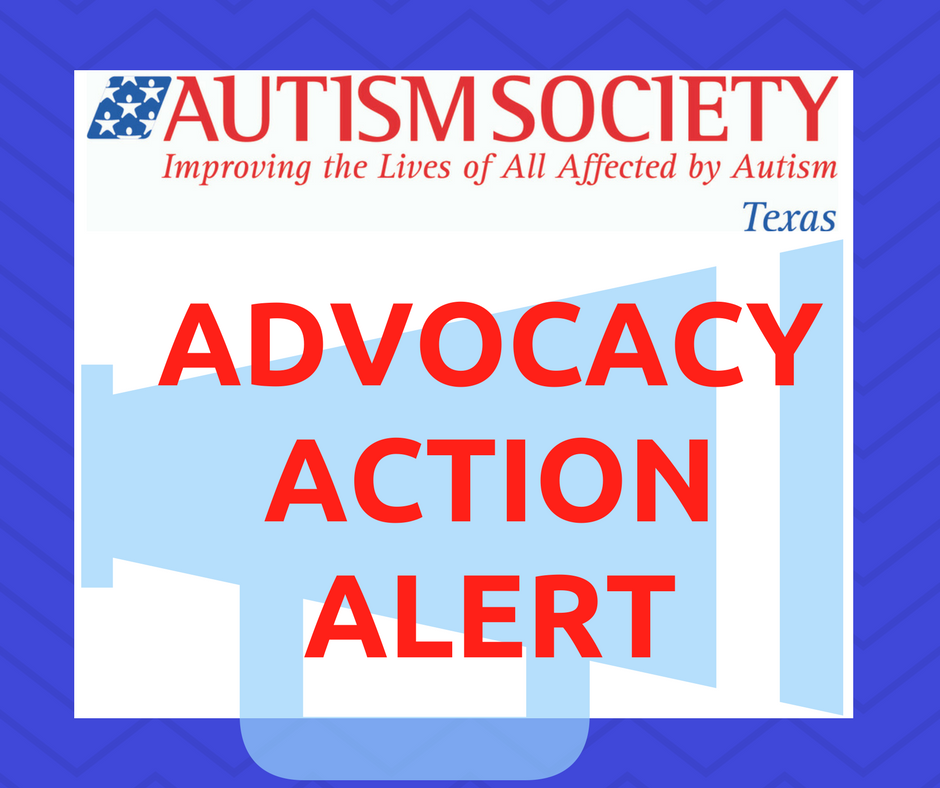TAKE TWO! NO TAX ON DISABILITY CALL-IN DAY!
The Tax Cuts & Jobs Act continues to be a threat to people with disabilities, with the potential for huge cuts to Medicare, Medicaid, and negative changes in provisions in the ACA. The Autism Society of America along with the state affiliates, have joined forces nationwide with disability rights groups and advocates to call in and oppose this act! Please call today. If you called the first time, thank you! We have another opportunity to act! Please call today, 12/12 or tomorrow morning 12/13 and let your opinion be heard!
Please call Senator John Cornyn and Representative Kevin Brady today and urge them to please vote NO on the Tax Cuts and Jobs Act. If you have more time, please call all the people listed in the information from Autism Society of America. Thank you!
We’re hearing that a vote on the final tax bill is not going to happen this week. This delay provides us more time to protest this bill and shows that our efforts so far have been effective. Please join people with disabilities, our families, and advocates around the country TODAY for a national call-in day to tell our Representatives and Senators to oppose the Tax Cuts and Jobs Act. We’re told that call volume on Capitol Hill has been high – keep it up!
Call the Capitol switchboard, or the numbers provided above, at 202-224-3121. This may be the most important vote of the year with the most far-reaching impacts for every individual and every family in the country.
The Tax Cuts and Jobs Act is very close to reaching President Trump’s desk and becoming law. Every Representative and Senator needs to hear about your opposition to this bill!
WHAT TO SAY
- I am a member of the Autism Society
- Please vote NO on the Tax Cuts and Jobs Act.
- This tax plan will significantly reduce federal revenue and will create pressure to cut Medicaid and other programs that are critical for people with disabilities.
- We cannot afford these tax cuts that disproportionately benefits the wealthiest Americans and large corporations.
——————————————————————————————————————————————————————————————————————
More information from Autism Society of America:
| The House and Senate each passed their own version of the Tax Cuts and Jobs Act, which means that now a conference committee must work out the differences between each bill to produce a final version. Both the House and Senate have appointed conferees (see below for list) that are working to come up with a bill that can pass both chambers. The private House and Senate Conferences will be meeting all week. A three hour meeting between the House and Senate Conferences is scheduled for December 13, 2017.
Senate Conferees:
House Conferees:
This means we still have a chance to stop these harmful and unpopular plans from becoming law and we urgently need your help to do so. Thank you to everyone who has called their legislators. Hill staff tell us the bill’s supporters are feeling the heat and need us to keep up the pressure. While neither bill directly cuts Medicaid, Medicare, Social Security, or other programs people with disabilities rely upon, they dramatically cut the revenue necessary to fund the programs people with disabilities rely on to live and work in the community. And many Members of Congress have recently said that cutting Medicaid, Medicare, and Social Security IS precisely the plan once they pass the tax cuts. TAKE ACTION We’re hearing that a vote on the final tax bill is not going to happen this week. This delay provides us more time to protest this bill and shows that our efforts so far have been effective. Please join people with disabilities, our families, and advocates around the country TODAY for a national call-in day to tell our Representatives and Senators to oppose the Tax Cuts and Jobs Act. We’re told that call volume on Capitol Hill has been high – keep it up! Call the Capitol switchboard at 202-224-3121. This may be the most important vote of the year with the most far-reaching impacts for every individual and every family in the country. The Tax Cuts and Jobs Act is very close to reaching President Trump’s desk and becoming law. Every Representative and Senator needs to hear about your opposition to this bill! WHAT TO SAY:
The Senate tax bill is extremely dangerous to the well-being of people with disabilities.
The House bill is also damaging as it proposes to eliminate several tax deductions and credits that benefit people with disabilities. These include:
The final version of the Tax Cuts and Jobs Act could contain any of these harmful provisions from the Senate and House bills. Additional Resources
|
| unsubscribe | | Visit our web site | Donate
Autism Society |

